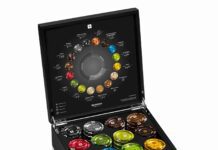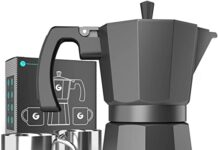When was the French Press invented? This is a question that has confounded historians and experts for centuries. Most believe it was first developed in the 15th century, but there is no definite answer.
What we know is that it quickly became popular throughout Europe and was used to make a variety of beverages, including coffee.
Today, the French Press is still a favorite among coffee lovers for its rich flavor and aromatic properties. If you’re looking for an exciting gift, consider purchasing one for yourself or someone you love!
History of the French Press
The French Press is one of the oldest printing technologies still in use.
Johannes Gutenberg invented it in the 16th century, and it became popular because it was fast and efficient. The French Press makes coffee, tea, and other hot drinks.
How the French Press Works
The French Press is a coffee brewing device invented in 1770 by Nicholas-Jacques Conte.
It is traditionally made of brass and has a plunger for extracting coffee grounds from the puck of coffee. The French Press is favored for its high extraction rate and smooth, rich flavor.
Secura French Press Coffee Maker, 304 Grade Stainless Steel Insulated Coffee Press with 2 Extra Screens, 34oz (1 Litre), Silver
$33.02 in stock
4 used from $31.37
BAYKA French Press Coffee Maker, Glass Classic Copper 304 Stainless Steel Coffee Press, Cold Brew Heat Resistant Thickened Borosilicate Coffee Pot for Camping Travel Gifts, 34 Ounce
$29.99 in stock
Different Types of French Presses
French presses are a type of coffee brewing equipment that originated in France. They are also known as “percolators.” French presses work by forcing hot water through ground coffee beans, which extracts more flavor and caffeine from the beans than other coffee brewing methods.
French press brewers generally use a higher proportion of ground coffee to water than other brewers, resulting in a more robust and flavorful cup of coffee.
French press pots come in various sizes and styles, from small portable models to large commercial versions. They can be used with either ground coffee or whole bean coffee and can be used with either hot or cold water. Some French press pots have filters built into them, while others require manual filter removal before brewing.
French pressed coffee is generally considered superior to traditional drip-brewed coffee because it has more flavor and caffeine. It is also less acidic than drip-brewed coffee, which some people find smoother and less bitter.
Pros and Cons of the French Press
The French Press is a coffee brewing device that has been around for centuries. It is a simple design – a container with a plunger attachment – that allows you to make coffee by forcing hot water through ground coffee beans.
The benefits of using the French Press are that it yields more flavorful coffee than other methods, such as a drip machine or cup-style brewer, and it’s easy to clean.
However, there are some cons to using the French Press. One is that getting the perfect ratio of grounds to water can be challenging, so you may have to experiment with different amounts until you find what works best for you.
Another con is that the plunger can be clumsy and messy, so care must be taken when using it.
Read Next – CHAMBORD French press Coffee Maker
How to Choose the Right French Press for You
The French Press is a coffee brewing device that has a long history. It was first used in the 16th century.
The French Press is made of different materials, including copper, brass, and tin. However, the most common material is copper. The French Press is also known as a plunger press or percolator.
History of French Press Coffee Maker
Can you list the most widely used newspapers in France? How many are? The simplicity and elegance of its design are instantly visible everywhere. Coffee plungers are often known across the world under various names.
Bodum, a famous American presses company in France, has been called Meliores. South Africans call it plunger coffee, while UK people prefer cafietieré. What’s the difference between a French newspaper and a French cafietier? Whatever the name says, this coffee plunger has an exciting history.
Secura French Press Coffee Maker, 304 Grade Stainless Steel Insulated Coffee Press with 2 Extra Screens, 34oz (1 Litre), Silver
$33.02 in stock
4 used from $31.37
BAYKA French Press Coffee Maker, Glass Classic Copper 304 Stainless Steel Coffee Press, Cold Brew Heat Resistant Thickened Borosilicate Coffee Pot for Camping Travel Gifts, 34 Ounce
$29.99 in stock
Read Next – Italian Coffee Maker and Its Benefits
When was the coffee plunger invented?
The origin of the coffee plunger is not entirely understood, but the Frenchmen Mayer and Delforge started producing them in 1853, and they are still in production today.
They were granted a patent, but in 1928 Attoilio Caliman and Giulio Moneta registered their invention patent similar to Mayer and Delforge.
Read Next – Find the Perfect Cafetiere for Your Home
Why do they call it a French press?
The first coffee presses that were likely made in France are today coffee presses with the rudimentary form: an insulated or cheesecloth screen that the user could press into hot water and coffee grounds.
In 1851 two French explorers (Mayer and Delforge) patented an early precursor to the French Press.
Where was the French Press invented?
The cafétere may seem unrecognizable, but the cafeteria was first designed and developed in Italy in 1934 by Milan’s Italian designer Attilio Calimani.
What is the real name of a French press?
In some places, the presses françaises are called caféteries or coffee presses. Today it has been praised for its simplicity, the rich brew it offers, and some of the flair maintained by the brewery through its development process.
What does a French press do?
A French press can make coffee by immersing ground coffee in boiling cold water. Water is needed for flavor extraction around 300 ° F. If the water temperature exceeds 21 degrees, the flavor of coffee is burnt.
Why is a French press called a French press?
What is likely the most popular design was invented by Faliero Bondini, the Swiss, in 1958, and the brewer was called ‘the chamber.’ The French popularity of Chambord has a French heritage and influenced the French cafetiéres.
Do French people use a French press?
Are French people using brewing techniques? Despite popular belief, there’s nothing wrong with that answer. The 1928 Italian edition improves on the concept created in 1852 and is the core of our French Press today. It’ll be possible to get the Press on the city’s streets, but it will not be available at most restaurants.
Secura French Press Coffee Maker, 304 Grade Stainless Steel Insulated Coffee Press with 2 Extra Screens, 34oz (1 Litre), Silver
$33.02 in stock
4 used from $31.37
BAYKA French Press Coffee Maker, Glass Classic Copper 304 Stainless Steel Coffee Press, Cold Brew Heat Resistant Thickened Borosilicate Coffee Pot for Camping Travel Gifts, 34 Ounce
$29.99 in stock
Why do we call it a French press?
The first coffee press, probably made in French, was the modern cup press in the rudimentary form—a steel or cheesecloth screen attached to a pipe and placed into which the customers would press into the boiling water and coffee ground. Two French inventors, Mayer and Delforge, have patented French presses since 1853.
What is a French press called?
French presses are often called coffee plungers in different parts of the world. This brewery is renowned for its ease of operation and its rich brews.
Where did the French Press originate from?
The French patent on a Press similar in appearance today was a patented invention by Italian Giuseppe Giuliano Calimani in 1929. What was arguably a popular design was patented by the Swiss Faliero Bondanini in 1958, and the brewery was called a Chamber in French manufacturing.
What do French people call a French press?
The French Press is known as cafétières (a coffee plunger) or coffee press in several locations.
French Press: A History in Paris
During this period, a Paris metal smith received an invention to filter coffee by using the piston machine. It’s the precursor of the French presses that we have now.
The French presses were the first definitively patented by the Italian architect Attilio Calimani in 1929 and aimed at making the best coffee for the palate.
The second patent was granted in 1958 by a Danish chef who made his coffee maker for the Danish kitchenware company Bodum and distributed it to Europe. Though quickly popular across Europe, the design took time to come to the U.S.
Read Next – SAMBANGAN French Press Coffee Maker
Secura French Press Coffee Maker, 304 Grade Stainless Steel Insulated Coffee Press with 2 Extra Screens, 34oz (1 Litre), Silver
$33.02 in stock
4 used from $31.37
BAYKA French Press Coffee Maker, Glass Classic Copper 304 Stainless Steel Coffee Press, Cold Brew Heat Resistant Thickened Borosilicate Coffee Pot for Camping Travel Gifts, 34 Ounce
$29.99 in stock
Utopia Kitchen 34 Ounce French Press Espresso and Tea Maker with Triple Filters, Stainless Steel Plunger and Heat Resistant Borosilicate Glass - Black
French Press Coffee Tea Press 34 oz, Stainless Steel Coffee Press with Temperature Display, Timer Reminder, Easy to Clean Glass Coffee Presser
QUQIYSO French Press Coffee Maker 34oz 304 Stainless Steel French Press with 4 Filter, Heat Resistant Durable, Easy to Clean, Borosilicate Glass Coffee Press, 100% BPA Free Glass Teapot (Copper)
Bodum 1928-16US4 Chambord French Press Coffee Maker, 1 Liter, 34 Ounce, Chrome
3 used from $26.16
Veken French Press Coffee & Tea Maker, 304 Stainless Steel Heat Resistant Borosilicate Glass Coffee Press, Durable Easy Clean 100% BPA Free, 34oz, Copper
Mueller French Press Double Insulated 304 Stainless Steel Coffee Maker 4 Level Filtration System, No Coffee Grounds, Rust-Free, Dishwasher Safe
Bodum - 1548-01US Bodum Brazil French Press Coffee and Tea Maker, 34 Ounce, Black
1 used from $17.99









































